Diplomatic Bluebook 2022
Chapter 4
Japan's Diplomacy Open to the Public
Section 3 Diplomacy with the Support of the Public
1 Proactive Communications to the Public
(1) Overview
Public understanding and support are indispensable for the smooth implementation of Japan's foreign policy. As such, providing prompt and clear explanations on the policy details and on the role of the government is crucial. Accordingly, the Ministry of Foreign Affairs (MOFA) is making efforts in timely and effective public relations, using various forms of media, lectures, publications and others.
(2) Providing Information through Domestic Media
MOFA has committed itself to promptly and accurately providing information through various media, such as newspapers, television and the Internet, in order to gain the understanding and support of Japanese nationals for Japan's foreign policy. To provide information effectively, regular press conferences are conducted by the Minister for Foreign Affairs and the Press Secretary, while extraordinary press conferences are held as necessary. Press conferences by the Foreign Minister are open to various media including Internet media, and the records and videos of the press conferences are posted on MOFA's website. During foreign visits by the Prime Minister or the Foreign Minister, MOFA provides information from visiting countries/regions via multiple means, including the Internet, so that people can promptly follow and understand the details and the outcomes of the visits. MOFA also regularly releases statements by the Minister for Foreign Affairs or Press Secretary on individual international issues, expressing the position of the Government of Japan. Similarly, MOFA frequently provides press releases on its daily diplomatic activities. Additionally, the Minister and State Ministers for Foreign Affairs explain the Government's foreign policies directly to the public through appearances on various media and interviews.
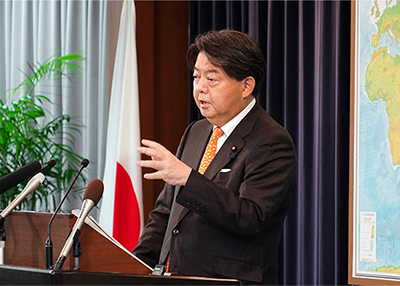 Press Conference by Foreign Minister Hayashi
Press Conference by Foreign Minister Hayashi(November 11, Tokyo)
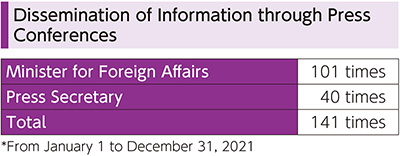
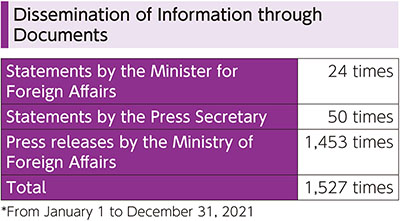
(3) Information Provision through the Internet
MOFA's website (in Japanese and English) is a way to promptly provide information on the diplomatic activities of the Prime Minister and the Foreign Minister as well as on Japan's foreign policy including territory/sovereignty, recognition of history and security along with the latest international relations and other basic relevant information.
MOFA's website in the Japanese language provides a variety of contents for Japanese nationals across a wide range of age groups, including the “Anything Report from Around the World,” “Find Out about International Situations” and “MOFA for Kids.” In particular, “MOFA for Kids” publishes contents for young people such as videos and quizzes to explain MOFA's activities in an easy-to-understand way, and Q&A corners explaining vocabularies and international issues that are covered frequently in the news and newspapers.
In addition to these, MOFA provides a variety of information through various social media platforms. In 2021, as face-to-face activities were significantly constrained due to the impact of COVID-19 for two years in succession, efforts were made to provide information through the Internet, such as live streaming of the regular press conferences by the Foreign Minister and posting of video messages delivered at international conferences on social media.
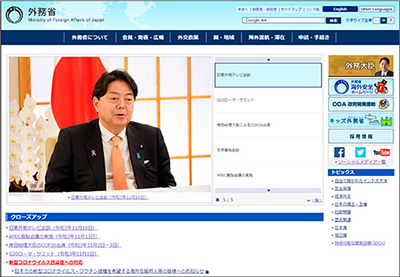 MOFA's official website
MOFA's official websitehttps://www.mofa.go.jp/index.html

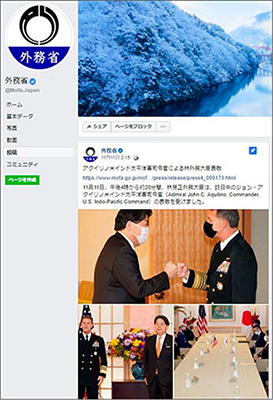 MOFA's official facebook account
MOFA's official facebook accounthttps://www.facebook.com/Mofa.Japan.en

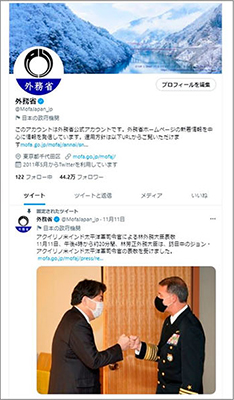 MOFA's official twitter account
MOFA's official twitter accounthttps://twitter.com/MofaJapan_en

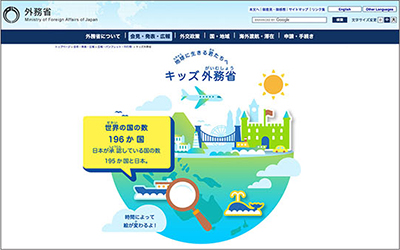 MOFA for Kids
MOFA for Kidshttps://www.mofa.go.jp/mofaj/kids/index.html
(Japanese language website only)

(4) Dialogue with Japanese Nationals
With the notion of “Public Relations through Dialogue,” MOFA promotes direct dialogue between the people of Japan and the Foreign Minister, the State Minister for Foreign Affairs, the Parliamentary Vice-Minister for Foreign Affairs and MOFA officials.
In December, Foreign Minister Hayashi and Japanese staff who serve as heads or in other positions of the Japanese offices of international organizations, and Parliamentary Vice-Minister for Foreign Affairs Uesugi Kentaro and Japanese staff of the Japanese offices of UN agencies inside the United Nations University building, sat around a table respectively and held lively discussions regarding the activities of the organizations and their partnerships with Japan.
At the “Dialogue with Students,” a MOFA seminar for university students and others held online in February, Parliamentary Vice-Minister for Foreign Affairs Suzuki Hayato gave an opening address, and Foreign Ministry officials exchanged views with a large number of the participating students during the lectures. At the “Children's Kasumigaseki Tour Day” held online in August, Parliamentary Vice-Minister for Foreign Affairs Suzuki answered various questions from elementary and junior high school students regarding diplomacy and other matters in the “Children's Press Conference.”
Various programs in which MOFA sends its officials to venues such as international exchange organizations, universities and high schools throughout Japan were conducted online (some in-person) due to the COVID-19 pandemic. Among them are “Lectures on the International Situations,” “Diplomatic Talks,” “Talks for High School,” “International Issue Presentation Contest” for university students and “Visits by elementary, junior and senior-high school students to MOFA.” Through these programs, MOFA is working to promote better understanding of foreign policy and international affairs among young people, who will bear the future of Japan on their shoulders.
MOFA officials also give lectures on Japan's ODA policies and specific measures to numerous schools in online “ODA Delivery Lectures.” Additionally, MOFA publishes the periodical journal “Diplomacy,” widely sharing information on discussions taking place in various areas and at various levels concerning diplomacy and international affairs relevant to Japan. In 2021 the journal took up a range of diplomatic challenges as themes, such as the outlook for the post-COVID-19 world, climate change and economic security, and featured a large number of essays and other articles from renowned experts both inside and outside Japan.
Moreover, MOFA also produced various easy-to-understand pamphlets for a broad readership as well as videos in order to promote a deeper understanding on the organizational structure and foreign policies of MOFA. In addition to the above, MOFA hears comments and opinions from the public through its website. Comments and opinions from the public are accordingly shared within MOFA and used as a reference in policy making and planning.
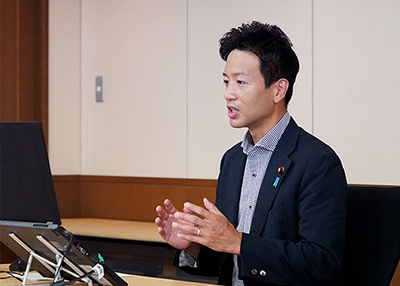 Parliamentary Vice-Minister for Foreign Affairs Suzuki responding to a question from a “child reporter” on “Children's Kasumigaseki Tour Day” (August 18 and 19, MOFA)
Parliamentary Vice-Minister for Foreign Affairs Suzuki responding to a question from a “child reporter” on “Children's Kasumigaseki Tour Day” (August 18 and 19, MOFA)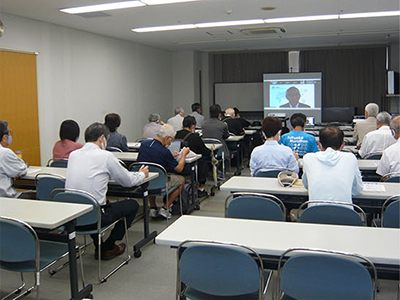 Lectures on the International Situations (October 7, UN Association of Japan Fukuoka Head Office)
Lectures on the International Situations (October 7, UN Association of Japan Fukuoka Head Office)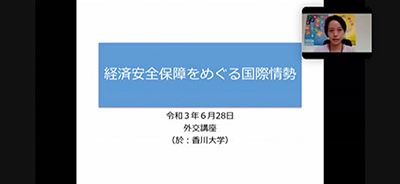 One of the Diplomatic Talks (June 28, Kagawa University)
One of the Diplomatic Talks (June 28, Kagawa University) One of the Diplomatic Talks (June 28, Kagawa University)
One of the Diplomatic Talks (June 28, Kagawa University)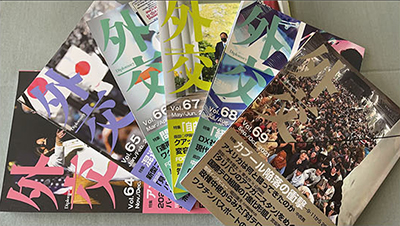 Periodical journal “Diplomacy”
Periodical journal “Diplomacy”(5) Promotion of the Declassification of Diplomatic Records and Access to Information
To further enhance the public understanding of and confidence in Japan's foreign policy, MOFA is actively engaging itself in the smooth transfer of records and their declassification. In addition, MOFA has been engaged in efforts to facilitate greater convenience in the public use of diplomatic documents.
MOFA preserves more than 120,000 historical materials, including 40,000 prewar historical documents in its Diplomatic Archives and has declassified its postwar diplomatic records since 1976 as a voluntary initiative. The Rules on the Declassification of Diplomatic Records, which were established in May 2010, stipulate: (1) the declassification of diplomatic documents created more than 30 years ago in principle and (2) the establishment of the “Committee for the Promotion of the Declassification of the Diplomatic Records” which is chaired by the State Minister for Foreign Affairs or the Parliamentary Vice-Minister for Foreign Affairs as well as attended by external experts, to further promote the declassification of diplomatic records and improve its transparency. The number of files that have been transferred to the Diplomatic Archives and made public since then reached approximately 36,000 by the end of 2021.
Furthermore, MOFA discloses information pursuant to the Act on Access to Information Held by Administrative Organs, while giving considerations to national security, the relationship of mutual trust with other countries, the impact on diplomatic negotiations and the protection of personal information. In 2021, MOFA received 1,245 requests for disclosure, and documents totaling 81,068 pages were disclosed.
